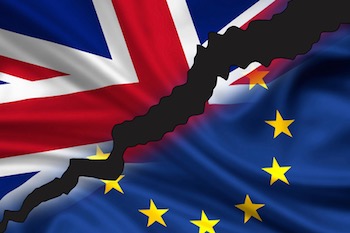 On 23rd June the UK voted to leave the European Union (“Brexit“). This decision will continue to have a significant effect on the IP/IT market which has been governed by so many EU Regulations and Directives in the past (albeit not exclusively) that intricately bound the UK to the EU.
On 23rd June the UK voted to leave the European Union (“Brexit“). This decision will continue to have a significant effect on the IP/IT market which has been governed by so many EU Regulations and Directives in the past (albeit not exclusively) that intricately bound the UK to the EU.
The UK will in due course enter a negotiation period during which laws will be amended and enacted and international agreements will be negotiated. Due to the required notice period, the actual exit date will not be before 2018. The exact fate of the UK is also still up for debate with many options including retaining membership of the EEA only, or joining EFTA, or having a customs-only arrangement with the EU. The implications of this Brexit are currently very uncertain and will, to a large extent, be determined by the model that would be adopted and the terms of any international agreements negotiated.
Relationship with EU law
IP laws are harmonized to a large extent across Europe, and much of the UK legislative framework in this field is currently composed of directly effective EU Regulations and transposed EU Directives. In order to avoid a regulatory vacuum, many of those EU Regulations relevant to IP and life sciences (especially pharmaceuticals) will have to be transposed into English or Scottish law, and those national laws which are based on EU Directives may also need to be reviewed to ensure they can still operate properly.
Implications of the Brexit
Some implications of the Brexit will apply to organizations in the same way whether they are based in the UK, in the EU or elsewhere in the world. For example, the changes to unitary patents are pertinent to any company seeking pan-European patent coverage, whereas the now likely exclusion of the UK from the European Digital Single Market, will be more acutely felt in the UK. Below is a summary of some of the main implications.
The unitary patent system
One example of where the immediate impact of Brexit may be seen is that the lengthy negotiations regarding the Unified Patent and the Unified Patent Court (UPC), which have taken decades, may be undermined. A “Remain” vote would have potentially meant that the system was implemented in early 2017, but in the light of the Brexit vote, there is likely to be a delay in implementation.
Without being part of the EU, the UK, whilst it will still be a signatory to the European Patent Convention and a UK patent could still be obtained via the EPC system, will not, as the legislation is currently drafted, be able to participate in the new UPC system, which only applies to participating EU member states.
Although it is early days, there are suggestions the UK may ratify the Convention and lobby to be part of the new regime, notwithstanding the likelihood that that it will not be Member State. This is not as easy as it sounds as the new arrangements are intimately entwined with the EU and having a second tier may not be easy. There is also a proposal that the UK does NOT ratify the Convention, thereby holding up implementation, perhaps on the basis that ratification could be used as a bargaining chip in the forthcoming negotiations with the EU.
If the UK fails to be included but the UPC is implemented nonetheless, it may, therefore, be seen as an irritant for companies which will need to go through another hoop to seek pan-European patent protection. Click here for further analysis.
Community rights
It is likely that community rights, such as registered and unregistered community designs and EU trade marks (previously community trade marks), will no longer have effect in the UK. Ultimately the scope of any rights applied for will not include the UK, and there will be questions about what will happen to the “UK portion” of such rights obtained before Brexit. If the right in question was automatically reduced in geographical scope, its value will diminish, especially given the economic significance of the UK, which could result in the right-holder losing out commercially. Any organizations which rely on community rights will now need swiftly to respond to changes in this area.
Life Science regulation
The UK’s various Life Sciences regulatory regimes are currently intimately connected with the EU; the European Medicines Agency is based in London and a sophisticated and comprehensive pharmacovigilance system has been established around this regime. Whilst change will, no doubt, be managed to enable a smooth transition, organizations working in this sector will need to be ready to adapt now that the regulatory framework is likely to be reshaped, and it has been mooted that the EMA will shift to another Member State.
European Digital Single Market
There is a real risk that the UK will be shut off from operating in the European Digital Single Market. The drive behind the single digital market was to promote common data protection laws, provide better access to products and services at reduced costs, and generally increase adoption and acceptance of digital services. There are significant differences in the attitudes of different European countries towards the use of social and digital media marketing and, in the absence of the UK within the EU, these differences are now likely to widen and the influence of the UK will be minimal.
Conclusion
Brexit is not going to be a simple divorce. Now any UK legislation, which has hitherto been dependent on EU legislation, will have to be unpicked. Beyond this, the key development in the IP field is the likely exclusion of the UK from pan-European rights systems. Separation presents the opportunity for the UK’s laws to diverge from those of Europe, which separation may be embraced in some areas. However, in IP, this is unlikely to happen to any significant extent given the interconnection of trade and the universal recognition that harmonization is beneficial. Going forwards, the UK is no longer going to be able to assert the same influence on EU policy, which may undermine the position of UK-based IP and IT companies both within Europe and on the world stage (especially vis-à-vis the USA as the UK may be seen as second class without a voice in Europe) and make it a little more difficult to compete.
Given the two year period (minimum) before which Brexit will be implemented, and given the uncertainty about what the exact Brexit environment will comprise, the long term future is still unclear. Thereafter, IP owners should identify which of their rights are now likely to be affected and may need further application/registration in order to achieve maximum protection over that right.
For any queries about any matters raised in this note, or other questions about how Brexit may affect your business, please contact Sally Shorthose ([email protected]).

![[IPWatchdog Logo]](https://ipwatchdog.com/wp-content/themes/IPWatchdog%20-%202023/assets/images/temp/logo-small@2x.png)

![[Advertisement]](https://ipwatchdog.com/wp-content/uploads/2024/04/Artificial-Intelligence-2024-REPLAY-sidebar-700x500-corrected.jpg)
![[Advertisement]](https://ipwatchdog.com/wp-content/uploads/2024/04/UnitedLex-May-2-2024-sidebar-700x500-1.jpg)
![[Advertisement]](https://ipwatchdog.com/wp-content/uploads/2024/04/Patent-Litigation-Masters-2024-sidebar-700x500-1.jpg)

![[Advertisement]](https://ipwatchdog.com/wp-content/uploads/2021/12/WEBINAR-336-x-280-px.png)
![[Advertisement]](https://ipwatchdog.com/wp-content/uploads/2021/12/2021-Patent-Practice-on-Demand-recorded-Feb-2021-336-x-280.jpg)
![[Advertisement]](https://ipwatchdog.com/wp-content/uploads/2021/12/Ad-4-The-Invent-Patent-System™.png)






Join the Discussion
No comments yet.